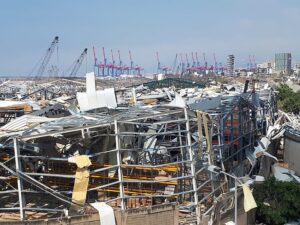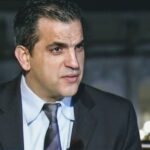Minds of the Movement
An ICNC blog on the people and power of civil resistance
by Joe MacaronOctober 19, 2020
Exactly one year ago, Lebanese took to the streets in massive rallies under the renowned slogan kilon yaani kilon (“all means all”), denouncing the country’s corrupt oligarchy. These unprecedented protests were leaderless and decentralized, both in urban and rural areas, and carried a message of hope and unity that condemned the sectarian and divisive agenda of the ruling class.
Commentators coined the term “October Revolution” to define these protests, giving the impression that it would result in a transition of power. While they indeed broke the taboo by publicly shaming the once untouchable ruling oligarchy, the new generation driving these protests has since been unable to find a path forward due to unclear policy objectives and inadequate operational capabilities with which to confront the entrenched nature of the Lebanese political system.
In addition, the succession of crises that hit the country over the course of the year caused major setbacks. In March this year, the Lebanese government imposed a nationwide lockdown after the coronavirus outbreak, which became a deterrent to holding protests. The Lebanese pound, pegged to the U.S. dollar for 30 years, has lost about 80% of its value, which had subsequent impact on the cost of living in the country. While the August 4 Beirut explosion has fueled anger towards the ruling elites, it has also led to despair among anti-corruption protesters. The political system is no longer merely an obstacle to socio-economic reforms, it has become a threat to the lives and security of ordinary citizens.
Strategic considerations and challenges

Protestors in Tyre/Sour, Southern Lebanon, cheering a female singer during nonsectarian demonstrations against government corruption and austerity measures in October 2019. Source: Wikipedia/Roman Deckert (CC BY 4.0, unedited).
At the peak of the protests last year, activists did not want to negotiate with the country’s leaders to form a new government. They pressured for a high-level resignation instead, targeting a political elite whom they held responsible for those economic woes—Prime Minister Saad Hariri announced his resignation within two weeks of the October 2019 protests. There were no serious attempts to use civil resistance strategies such as strikes, boycotts, civil disobedience, or noncooperation to forcibly change the social order, nor to offer an alternative.
Developments in the past year have further undermined the potential of these protests and exposed the failures of the Lebanese political system. In the wake of the Lebanese lira’s devaluation, ordinary Lebanese have not been able to withdraw their money from the banks or meet in person given social distancing preventive measures, not to mention are having to deal with the fallout of the devastating Beirut port explosion. Over the past few months, many young activists have gone silent on social media and others have begun exploring emigration options. This potential ‘people power’ drain could deprive Lebanon of its best talent—people who can not only protest the status quo forces but be a partner in building the country’s future.
Business as usual
Meanwhile, the country’s ruling oligarchy has returned to business as usual. This indifference is feeding anger and cynicism among protesters rather than hope and engagement. After accusing protesters of benefiting from Western funding, Lebanon’s ruling class agreed in principle to a French initiative of creating a reform government that unlocks international aid and, under U.S. pressure, rushed to negotiate a maritime border dispute with Israel. Lebanon’s leaders are once again using foreign aid and support as a life vest to save themselves from scrutiny and accountability at home.

Aftermath of the August 2020 explosion at the port of Beirut. Source: Wikipedia/Freimut Bahlo (CC BY 4.0, unedited).
The August 4 Beirut port explosion—possibly the strongest non-nuclear explosion ever to happen in an urban center—demonstrated how a failing state destroyed its own capital and killed its own citizens through negligence, incompetence, and corruption. More than two months after this massive explosion, Lebanese authorities have not held a single press conference to explain what happened, no formal investigation has been announced, no official has been held accountable, and Lebanon remains without a credible government.
Incidentally, many of the activists and civil society groups who challenged the ruling oligarchy a year ago have filled the vacuum of the Lebanese state after the explosion and played a key role in cleaning up the rubble and providing assistance for the distressed population. This form of parallel institution building carries great potential and should perhaps be a priority for activists in the short term.
What way forward?
Lebanese activists have lost their way in these transformative and traumatic cataclysms of pandemic and explosion. They must learn from the lessons of the past year and set clear achievable goals while adapting to a post Covid-19 environment of activism. The primary challenges going forward are a political class that manipulates activists’ differences, sends paramilitary forces to disperse them when needed, dominates them in the traditional media, and uses the judiciary and security branch to silence them.
The priority moving forward could be developing self-organization and public communication skills, which echoes ICNC’s strategy web on mobilization, discipline, and public discourse. Movement leadership and unity also present a real challenge in the short term, as there are many scattered and ineffective smaller groups around the country.
Most of all, Lebanese protesters can’t seem to catch a break to regroup and re-strategize. Recent events have made achieving their aspirations even more difficult. Still, protests over the past weekend marking the one-year anniversary of this movement have shown that the seeds of that revolution still live on.
Regardless, it has become clear that the political system is so broken that trying to fix it through institutional channels won’t be an effective strategy. Nonviolent resistance—whether street actions or any number of other tactics that harness people power—is perhaps the only hope the Lebanese people have to forge a way forward.

Joe Macaron
Joe Macaron is a fellow at the Arab Center Washington D.C. and a Ph.D. student at the University of Bath (U.K.). His research primarily focuses on U.S. policy, international relations, and conflict analysis in the Middle East.
Read More